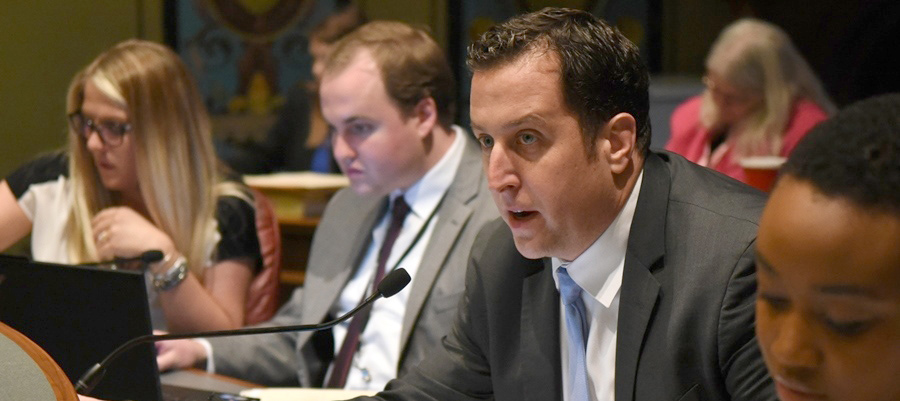- Details
- Category: Press Releases

SPRINGFIELD — As the federal government rolls back regulations to allow commercial websites like Google and Facebook sell Illinois residents’ personal data; State Senator Michael E. Hastings (D-Tinley Park) is leading the charge to increase protections.
Hastings passed Senate Bill 1502, the Right to Know Act, which would allow consumers to request what information such companies collect about them. Click here to listen to his remarks.
“As the federal government continues to roll back regulations that would allow companies like Google and Facebook to sell and share your personal data, the need for state regulations has become absolutely vital,” Hastings said. “This day and age we can do everything online from paying our bills to buying groceries. The price of surfing the web shouldn’t mean sacrificing your privacy and personal information.”
Current Illinois law requires businesses that collect personal informational to implement security measures to notify customers of security breaches. However, commercial websites are not required to notify residents what data they collect or whom they share that data with.
“I care about our neighbors and I care about all the sensitive information that is shared and sold,” Hastings said. “This is your personal information. You should know who is storing your records and who has access to them.”
This new initiative would require commercial websites that collect personal information to notify customers of the information they have collected as well as any third parties with whom
they may have disclosed personal information.
“Cybersecurity is a big deal,” Hastings said. “It’s important for Illinois’ laws to update and evolve with the needs of the people. This is a small step to protect Illinois residents’ privacy and security.”
Senate Bill 1502 passed the Senate and now moves to the House for consideration.
- Details
- Category: Press Releases

SPRINGFIELD— State Senator Michael E. Hastings (D-Tinley Park) worked today to investigate the cybersecurity breach at the Illinois State Board of Elections.
During the 2016 election year, 70,000 to 80,000 names from the State Board of Elections voter registration system were compromised.
Hastings convened the Illinois Senate Subcommittee on Cybersecurity to receive a full report on the cybersecurity breach that the Illinois State Board of Elections experienced during the 2016 election year to ensure Illinois residents that protections are in place to protect their personal data and resolve unanswered questions.
“Our elections are a sacred component of our nation’s democracy,” Hastings said. “I cannot stand up as foreign agents meddle in Illinois and U.S. elections. I do not care what political party the people of Illinois pick to represent them, but I do want outcome of our elections to be accurate.”
The Illinois State Board of Elections reported that seven IP addresses were linked back to the Netherlands. Two servers were reported to have participated in the attack, “Fancy Bear” and “Cozy Bear”, which are the two largest hacking groups rumored to be tied to the Russian federal security systems run by King Servers, which is stationed in Russia.
Hastings reiterated that the hacking of voter registration data in Illinois was similar to security breaches at the national level and in France and Denmark.
A key finding from the hearing, found as local election authorities synced and update data with the Illinois State Board of Elections, was that the local election authorities databasescould possibly become compromised as well.
Hastings is calling for the Illinois State Board of Elections to aid local election authorities to scrape their system of potential malware software to remove any type of security weakness.
His office will be sending out a letter to every local election authority urging them to scrape election databases to prevent possible hackers and intrusive software that may be hiding within their systems.
“I am extremely concerned that our local and state election authorities may have hackers hiding within our databases phishing for future attacks,” Hastings said. “Our democracy is important. It is important enough that I put my life on the line for our nation, as many others have. I will not rest until we take every precaution to ensure similar attacks on our liberties and righteous values do not happen again.”
Hastings commended the representatives from the Illinois State Board of Elections for their forthright and honest answers.
- Details
- Category: Press Releases

SPRINGFIELD- State Senator Michael E. Hastings (D-Tinley Park) is working to combat alarming veterans suicide statistics in the nation.
According to a recent study by the U.S. Department of Veterans Affairs, 22 veterans commit suicide every day in the U.S.
House Bill 2647 is a collection of comprehensive recommendations that work to ensure veterans have better access to services, treatment for mental trauma and depression as well as better access to employment opportunities.
State Senator Michael E. Hastings (D-Tinley Park), a former U.S. Army captain, is proud to be part of this vital initiative. Hastings served in Operation Iraqi Freedom and is in constant contact with many men and women from his unit.
As he meets with veterans in his community there is a common theme, disconnect between state and federal veterans benefits.
“Our nation’s heroes shouldn’t have to jump through hoops to receive benefits they qualify for,” Hastings said. “The state and federal government is trying their best to make sure veterans have the necessary resources to transition back to civilian life. However, the hurdles, redundancies and extra paperwork they have to go through to actually receive the benefits don’t make sense. Our goal is to streamline the process to ease the burden on our returning veterans.”
This week, House Bill 2647 advanced with bipartisan support out of the Senate’s Veterans Affairs Committee.
“One veteran that is lost to suicide is one too many,” Cullerton said. “The proposals outlined in this legislation are common-sense solutions to help Illinois remove barriers between veterans and the resources they qualify for. This initiative wasn’t compiled in haste but over hours and weeks of testimony, input and concerns raised by veterans, their loved ones and veterans organizations throughout the state. This is a true testament to their hard work and dedication to our nation’s heroes. I’m proud to advance this measure and be part of this monumental effort.”
A common theme throughout the process is finding ways to access veterans resources promised to the state as well as disconnect between federal and state resources. House Bill 2647 creates a connection between the Illinois Department of Veterans’ Affairs and the U.S. Department of Defense to help streamline and remove redundancies when returning veterans redeem benefits.
- Details
- Category: Press Releases

SPRINGFIELD— One of the biggest challenges returning servicemen and women face are figuring out how military training credits transfer to college credit.
To tackle this hurdle, State Senator Michael E. Hastings (D-Tinley Park) passed Senate Bill 736 to direct Illinois higher education institutions to establish a policy for awarding academic course credit for military training.
“Our nation’s heroes have on-the-job training,” Hastings said. “It’s my honor to work with higher education facilities and the state legislature to ensure returning veterans receive credit for the valuable skills they acquire during their time in the military.”
After talking to many returning veterans, Hastings found the current system is imprecise. This creates a complicated and inaccurate process to translate military experience into college credits at Illinois’ universities and community colleges.
There are a number of reasons for the confusion, the main reason being the descriptions for military training and college courses do not always match up perfectly. Also, military acronyms on transcripts may also mean different classes or curriculum based on each branch of service.
Often it becomes a matter of the higher education institutions willingness to research ways to find equivalent civilian academic courses. A standardized system will end confusion and create an easier transition for our military personnel.
According to the U.S. Department of Veterans Affairs, over 773,000 veterans are now using their GI Bill benefits to go to college, spending a collective of $11 billion a year.
“Repeating coursework promotes a slow and unnecessarily expensive educational process for veterans,” Hastings said. “Here in Illinois, we have workforce shortages for registered nurses, EMTs and other medical specialties. Who is better equipped than our returning servicemen and women to fill these job openings?”
Hastings’ initiative will require community colleges and universities to submit their policies for awarding credit to the Board of Higher Education and the Illinois Community College Board for review before June 30, 2019, and before June 30 every other year afterwards.
“This entire process can be complex and discouraging,” Hastings said. “It’s our duty to create an easy transition for Illinois’ veterans into civilian life, not force them through overcomplicated bureaucracy.”
Hastings passed Senate Bill 736 with bipartisan support, and it now moves to the House for consideration.
More Articles …
- Senator Michael E. Hastings works to honor one of our nation’s heroes
- Senator Michael E. Hastings denounces the Trump administration’s degradation of privacy rights to consumers online
- Senator Michael E. Hastings invites residents to CTF Illinois Hiring Event
- Senator Michael E. Hastings helps give Illinois’ children a second chance
Page 63 of 89


